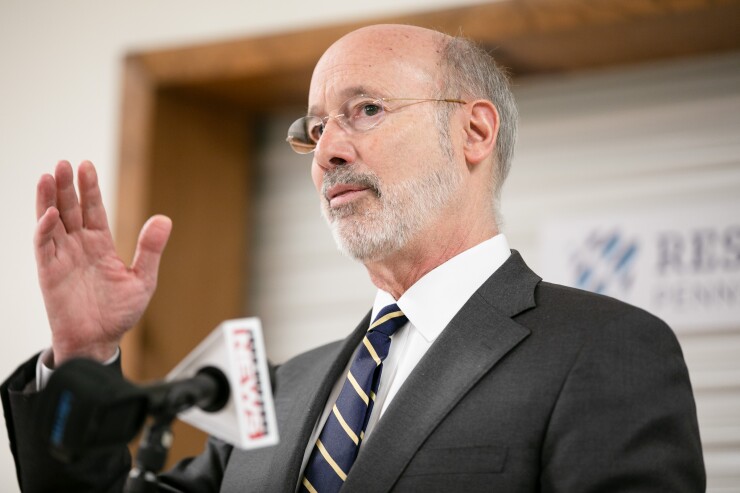Pennsylvania Gov. Tom Wolf announced a $4.5 billion, four-year infrastructure resilience initiative.
The governor announced his plan Thursday in Tremont, where he was viewing the recovery from last year’s flash flooding in the Schuykill County community.

Funding the program,
“I visited Tremont after the flooding last year and was frustrated that Pennsylvania lacks the funding this community needs to recover and prevent future floods,” Wolf said Thursday, flanked by other state leaders and local officials.
According to Wolf, the initiative will encompass new and expanded programs for priority infrastructure areas including high-speed Internet access; storm preparedness and disaster recovery; downstream manufacturing; energy infrastructure and transportation capital projects.
Prevention measures would include upgrades to flood walls and levees; replacement of high-hazard dams, and stream restoration and maintenance. The program would also assist environmental projects.
Restore Pennsylvania, Wolf said, would provide the funding to help communities offset flood control project costs, and assist homeowners by establishing a disaster relief trust fund to assist with losses that the Federal Emergency Management Agency will not fund.
Last year was the wettest year on record in Pennsylvania. An early-August storm created more than $60 million in damage to transportation infrastructure alone in the middle of the state.
Wolf said a “reasonable” shale tax could generate about $300 million annually.
The severance tax effort has failed repeatedly in Harrisburg. Pennsylvania is the only oil- and gas-producing state without such a tax, although the commonwealth does charge a flat-rate “impact fee” based on production volume.
"Wolf is a pragmatist in a state divided between east and west," said resilience expert Alan Rubin, a principal at law firm Blank Rome LLP in New York. "In the east, he has huge support for climate-change initiatives. In the west, he does not.
"He has to mollify different parts of the state. He's using climate risk to facilitate a budgetary solution."
The Marcellus Shale Coalition said in a statement that Wolf's tax would "cost consumers and hurt local jobs.”





